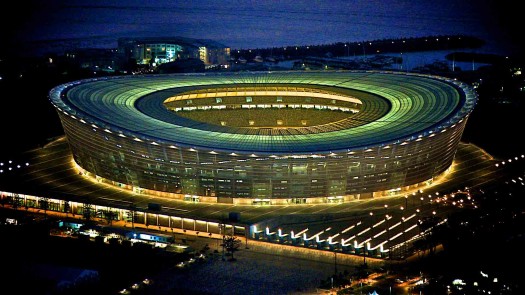
Writing for BBC Africa, correspondent Andrew Harding shares some of the lessons learned from the 2010 World Cup held in South Africa. FIFA’s 2014 World Cup has been plagued with some of the same challenges that have led to anti-World Cup protests throughout Brazil, mostly Sao Paolo and Rio. Like South Africa, the 2014 is marked by hope and despair. Parties and murals demonstrate the conflict that Brazilians have over the abject poverty that many in the country face, while pouring billions of dollars into venues and infrastructure to host the 2014 World Cup. Coupled with controversy surrounding contracts that will mainly benefit FIFA as opposed to locals, the lead-up to the World Cup that many hope will land Brazil a 6th win, has been hauntingly similar to South Africa.
Harding reports:
“It was a success for Fifa and the corporate sponsors made a lot of money, but it left local businesses and the state floundering,” said Johannesburg-based researcher Dale McKinley, pointing out that of the eight stadiums built or refurbished for the World Cup, only one – the iconic FNB stadium outside Soweto – “is financially viable”.
Harding offers an example of the Matsafeni village located outside of Nelspurit in South Africa. He writes:
Four years after a giant orange stadium appeared on their land, the inhabitants of Matsafeni village outside Nelspruit in South Africa say they are still waiting for their World Cup legacy. ‘They lied to us and betrayed us,” said Imaan Milanzi, a community liaison officer, pointing to a muddy hole in the ground surrounded by rubbish, bushes and banana plants.
Half a dozen people, holding battered old plastic paint tubs, had formed a casual queue (line), waiting for their turn to access the borehole – their one, trickling water supply.
‘Things didn’t go as planned,’ said Mr. Milanzi, of the local government’s redevelopment plans.
‘They first promised to supply water, upgrade houses and roads. But they just built the stadium and disappeared.'”
While positive things occurred like the improvement of the high-speed Gautrain which connects OR Tambo airport with Johannesburg and Pretoria, other challenges have emerged like pricing for the Gautrain which most South Africans cannot afford and the introduction of tolls on the improved roadways. The same challenges are now facing Brazil.
Even Brazilian soccer (football) star Pelé and the Catholic Church have spoken out about the enormous expense that the Brazilian government has pumped into the games while failing to meet the needs of the people.
Jonathan Watts of The Guardian writes:
“But ever since mass protests during the Confederations Cup last year, public awareness of the social and economic costs of the tournament have made many uneasy about displays of enthusiasm. As compared with previous World Cups, public support is low. A poll by the Pew Research Centre suggests that 61% of the public feel that hosting the World Cup was a bad idea, because it diverts resources that could be better spent on public services such as healthcare.
Everyone from Pelé and Romário to the Catholic church has criticized the expense and delays. The footballer-turned-congressman Romário has described the impact on state funds as “the biggest heist in the history of Brazil”. Last week the bishops’ conference issued a ‘red card’ to the organizers for squandering public funds and evicting people for stadium construction.
‘The church wants to contribute to the public debate and express its concern with … the inversion of priorities in the use of public money that should go to health, education, basic sanitation, transportation and security,’ it said.”
While many think of the 2014 World Cup already as a win for the people of Brazil, similar to what many people thought of South Africa’s win to host the 2010 games, the growing anti-2014 World Cup protests serve as a reminder that all that glitters isn’t gold.
This post was written by Nsenga K. Burton, Ph.D., founder & editor-in-chief of the award-winning news site The Burton Wire.
Read more about this story at BBC Africa or The Guardian.
Like The Burton Wire on Facebook. Follow us on Twitter @TheBurtonWire.









From all I’ve read and heard it will be a miracle if people don’t get hurt in the unfinished structures. The corruption caused the cost to jump over ten times of the original estimate. I am outraged that Brazil displaced families that are now homeless.
Thanks for the post about World Cup. Just a tip about those who don’t live in countries that stream world cup online. You can use UnoTelly to remove the geoblock and stream World Cup 2014 in your country free https://worldcup.unotelly.com
Thanks Isobel!
Comments are closed.